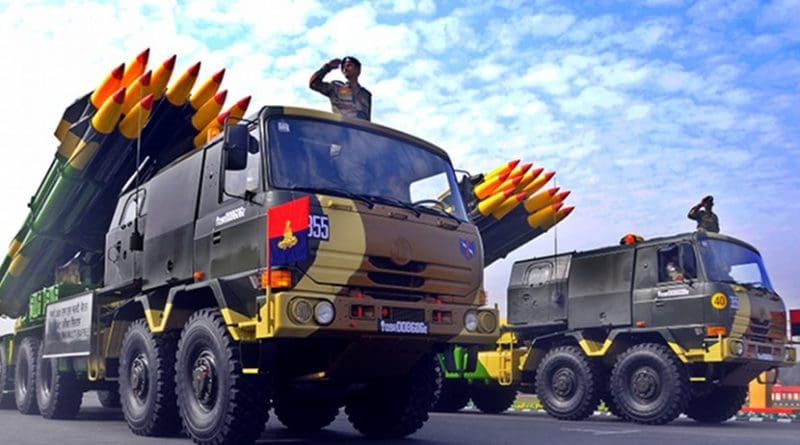India-Africa Defence Ministers’ Conclave: A Fresh Initiative – Analysis
By Manohar Parrikar Institute for Defence Studies and Analyses (MP-IDSA)
By Ruchita Beri*
The first India-Africa Defence Ministers’ Conclave on February 6 at the ongoing DefExpo2020 in Lucknow is a fresh initiative by India to enhance relations with countries in the continent. Defence ministers of about 14 African countries are expected to participate in the conclave. This initiative will provide an opportunity for India and the African countries to understand common security challenges and explore further cooperation in the defence and security sector.
African Security Challenges
In recent years, there has been an overall decline in conflicts in Africa. However, conflict continues to simmer in parts of the Horn of Africa, North Africa, West Africa, Sahel and the Great Lakes region. As in the rest of the world, terrorism and violent extremism is also a cause of instability in Africa. There are a large number of terror groups operating on the continent. Boko Haram continues to terrorise civilians in Nigeria and the neighbouring countries in West Africa. In the Sahel, a large number of violent incidents have been attributed to the Islamic State of Iraq and Syria (ISIS) affiliated Islamic State in Greater Sahara and a coalition of extremists linked with Jama’at Nusrat al-Islam wal Muslimeen (JNIM) or Group for the Support of Islam and Muslims. In North Africa too, threat from ISIS continues to linger. Similarly, maritime challenges such as piracy, armed robbery, and illegal, unreported and unregulated fishing, smuggling, human and drug trafficking have long troubled the Indian Ocean and Atlantic Ocean littoral countries in Africa.
African countries have developed mechanisms such as the African Peace and Security Architecture for conflict resolution and peacekeeping in the continent. Similarly, maritime security is an increasing priority. The African Union (AU) has adopted a pan-African maritime strategy, known as 2050 Africa’s Integrated Maritime (AIM) Strategy, to tackle the growing maritime insecurity in the region. This strategy is unique as it calls for both reduction of traditional maritime challenges and also sustainable development of the African blue economy. While African countries have been involved in finding African solutions to African problems, they have also welcomed support from external partners and international organisations. They are still dependent to a large extent on funding by the United Nations (UN) and bilateral donors to sustain the peace operations.
India-Africa Defence Cooperation
Defence and security engagement has been a part of India -Africa ties for several decades. This mainly involved training, participation in the UN peacekeeping missions in the region, and maritime cooperation. India has trained military officers from several African countries at its military training institutions. The current Nigerian President Muhammadu Buhari is a prominent alumnus of India’s Defence Services Staff College, Wellington. India has also contributed to peace in the African continent through active participation in the UN Peacekeeping Operations (UNPKO). Similarly, India has a robust maritime security cooperation with Indian Ocean littoral states in Africa. India has deployed its navy for anti-piracy patrolling, surveillance and humanitarian and disaster relief operations on request from African countries across the Indian Ocean region.
Further, the Indian Navy was the first international responder in Cyclone Ida in Mozambique in 2019. Similarly, it was the first to respond to the cyclone in Madagascar last month. India has also conducted joint military exercises with representatives from Africa countries. The first Africa-India Field Training Exercise-2019 (AFINDEX-19) took place at Pune in March 2019. This landmark exercise brought together representatives of the Indian Army and 17 African nations. AFINDEX-19 provided an opportunity for the participating nations to work together in humanitarian mine assistance and peacekeeping operations under the UN mandate. Similarly, several African countries have been part of the MILAN series of biennial exercises of the Indian Navy. Some African navies are expected to participate in the latest edition of the exercise next month. This naval exercise aims to increase cooperation with countries in the Indian Ocean region.
The Conclave
The India-Africa Defence Ministers’ Conclave is taking place at an opportune moment. Peace and security are currently a key priority for the African countries. “Silencing Guns: Creating conducive conditions for African Development” is AU’s theme of the year. The AU road map to attaining this vision acknowledges the linkage between peace, security and development. This matches with Prime Minister Narendra Modi’s vision of SAGAR (Security and Growth for All in the Region).
In recent years, India has given a high priority to strengthening its ties with the African countries. India’s increasing outreach is visible from the numerous high-level visits from India to Africa and the announcement to open 18 new diplomatic missions in the continent. However, India’s increasing engagement with the diverse continent is akin to interests of Africa’s other external partners such as China, United Kingdom (UK), France, United States (US), Turkey and Brazil. China has stepped up its engagement with Africa and launched the first China-Africa Security Forum in 2018. Of late, China has faced some criticism on the continent for its debt-trap diplomacy. These voices became strident after China took over Djibouti’s Doraleh Port. India, on the other hand, has emphasised that its engagement in Africa is inclusive and based on African priorities.
The India-Africa Defence Ministers’ Conclave is a step towards engaging the African countries on peace and security. It is hoped that the conclave leads to a candid discussion on common security challenges and examines the ways and means to further enhance cooperation between India and the African countries.
*About the author: Ruchita Beri is Senior Research Associate at the Institute for Defence Studies and Analysis, New Delhi
Source: This article was published by IDSA

